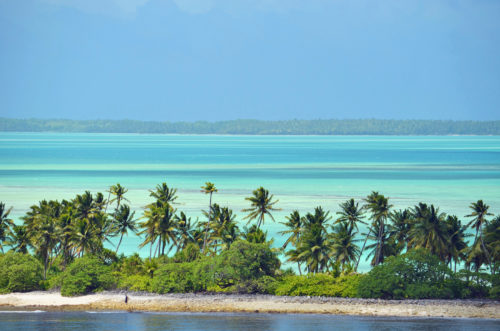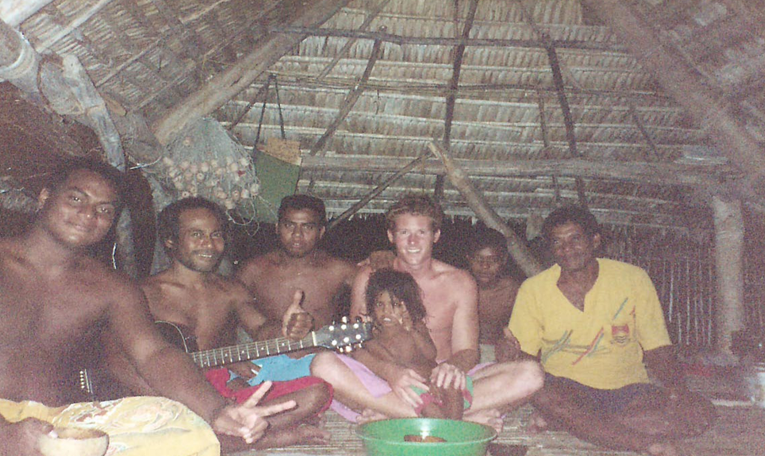
Why Disappearing Islands Should Matter to All of Us
The Republic of Kiribati is disappearing. The group of 33 Pacific Islands, home to more than 100,000 people, is one of the most vulnerable nations in the world to climate change. As the islands average only six feet above sea level, they are the proverbial canary in the coal mine for islands around the world. Kiribati is a stark reminder that the Earth is an island, with limited resources that we depend on for survival. It’s a dire warning for all of us.
The latest report from the Intergovernmental Panel on Climate Change (IPCC) states that some of the Pacific Islands—including Kiribati—will disappear within the century. This underscores the fact that we must act now if we want to save humanity. However, despite the dire forecast, island nations are not sitting by idle waiting for the inevitable. Instead, they are seizing the opportunity to become models for the rest of the world of how to transition to a resilient, clean energy future.
The Climate Crisis Hits Close to Home
I had the opportunity to live and work in the Pacific region for more than six years. I became a part of the community, speaking I-Kiribati fluently, forging and maintaining lasting relationships, and even holding a chief title in Samoa. I saw firsthand how island nations are on the frontlines of climate change, from coastal flooding, tropical storms, and sea level rise. This is despite the fact that island nations and other Global South nations have done the least to contribute to climate change.

Since then, I have dedicated my personal and professional life to helping poor nations and island countries adapt to and mitigate the impacts of climate change.
From Climate Victims to Climate Champions
The good news is that Island nations are taking concrete steps to redefine themselves from victims to solution providers of the world’s most challenging problem—how to combat climate change. They are doing this by demonstrating that it is possible to transition from fossil fuels, which are unsafe, volatile, and unhealthy, to renewable energy that is safe, resilient, and clean.
RMI has partnered with more than 15 countries in the Caribbean, taking a front row seat in watching island nations transform their energy systems. Within each country, RMI focuses on supporting local resilience through the deployment of decentralized, renewable energy technologies such as microgrids and storage technologies from concept to commissioning. To achieve this, RMI tailors its key service offerings to regional contexts such as identifying and developing projects, aligning key national stakeholders, and advising business decisions.
For example, RMI recently supported the government and utility of The Bahamas in Abaco in rebuilding their energy system cleaner, stronger, and ultimately in a less costly way after Hurricane Dorian. RMI did so through building a resilient 2.5 megawatt microgrid system 15 acres in size, supplying 10 percent of the local communities’ energy needs.
Access to Climate Finance as a Key Catalyst
Through our seven years collaborating across 15 Caribbean countries, alongside our partners, we have celebrated various clean energy milestones—cumulatively developing and installing 76 MW of renewable energy projects in the region. We have also witnessed firsthand the shared barriers that nations face. One of the most prominent: lack of access to finance.
Despite having abundant resources of sun and wind, the energy transition has not happened at the pace and scale in island nations needed to realize the business case for lower-cost, more resilient power supplies. Further, the scaling of successful energy projects in the Caribbean and beyond is critical to realizing national and global climate targets, while building climate resilience from the bottom up. However, that barrier is also the biggest opportunity.
In 2020, the RMI Climate Finance Access Network (CFAN) was born. CFAN is a global network designed to providing a prompt, demand-driven, and practical solution to the climate finance bottleneck in Small Island Developing States, Least Developed Countries, and African countries. CFAN does so through providing locally hired, highly trained, embedded climate finance advisors and ongoing technical support to structure and secure funding for clean energy projects and investments. The result? Enabling scaling and accelerating community-led regional energy transitions.
CFAN aims to place 30 advisors in countries across the Pacific, Africa, and the Caribbean by the end of 2022. These advisors will be placed specifically to empower countries in the Global South to enact risk-reduction measures, build capacity, and unlock critical climate investments. CFAN recently announced the first eight countries to receive these advisors—Fiji, Kiribati, Papua New Guinea, Samoa, the Solomon Islands, Tonga, Tuvalu and Vanuatu.
Join the Conversation
RMI understands this is just the start of a much larger conversation—a conversation that is led by the voices of the Global South. These nations have made it clear that scaling up financial support from the Global North, along with technology transfer and capacity building, must be priorities for the upcoming UN Climate Change Conference (COP26) and beyond. While the volume of available funding has increased, the $100 billion promised in commitments to the developing world has not been delivered, and the international climate finance system has become increasingly burdensome.
Of course, this is assuming that people from the Global South can actually make it to COP26. Many of these nations do not have access to COVID-19 vaccines, making it difficult for them to attend the conference due to quarantine requirements and travel bans. Aubrey Webson, chairman of the Alliance of Small Island States, told the Washington Post that a quarter of delegates from low-lying island nations will be forced to quarantine. “Getting to Glasgow is already going to be an almost insurmountable endeavor for many developing countries,” he said, “and adding this burden could well be a breaking point.”
It is crucial that voices from island nations and other developing countries be heard—and you should care. The impacts of the conversation extend beyond the words exchanged and commitments made at COP26. Rather, the real impact is how those actions can preserve island nations as habitable homes for generations to come, and as tests grounds for a global clean and resilient energy transition. Join us September 8 for a webinar featuring specialists and voices from the Global South discussing the targeted actions needed in the lead up to COP26.
Register for Voices of the Global South: Islands Keeping 1.5 Alive